The pectoralis major tendon is at its weakest where it inserts into the humerus and can end up swollen. Take note that this is quite common among individuals who play racket and throwing sports as well as rowing, swimming and weight lifting.
Symptoms
The signs and symptoms of inflammation of the pectoralis major tendon usually include soreness at the front part of the upper arm up to the shoulder where the biceps tendon connects into the bone.
The individual will experience pain when the muscles are used especially when attempting to jerk the arm across the anterior part of the chest in contrast to resistance or circling the arm inwards against resistance.

Remember that pain can manifest in a gradual manner. Certain sports that might have triggered the injury such as bench press in weight lifting can be painful or uncomfortable for a period of time.
Overview on inflammation of the pectoralis major tendon
The pectoralis major muscle is a large-sized and powerful muscle situated in the front part of the chest. The muscle is used in rotating the arm inwards, pulling the arm from above the head down, pulling a horizontal arm across the body and pulling the arm from the side upwards. The tendon in which it inserts into the arm can end up swollen. Remember that it usually occurs among those who play racket sports, swimming, rowing, weight lifting and sports that involve constant throwing.
Treatment
As part of the treatment for an inflamed pectoral major tendon, the individual must rest. Since this is often linked to overuse, continuing to train or engage in activity will not allow the injury to heal properly. It simply means that the healing process is disrupted if the individual will not take a break from training or any activity.
In case it is very painful, you have to apply an ice pack for the first two days at 20 minutes at a time for each application at 3-8 times throughout the day. Once the initial swelling has reduced, you can apply heat and utilize a heat retainer. If you want to readily manage the symptoms of this condition, it is important that you know how to properly provide heat and cold therapy. To learn to recognize and manage tendon injuries, sign up for a first aid class with a credible provider near you.
When to consult a sports injury professional
The sports injury professional will recommend anti-inflammatory medications particularly ibuprofen. In some cases, laser treatment or ultrasound can be used to help minimize the inflammation and pain. Even sports massage techniques can be used particularly on the chronic cases. Additionally, cross friction massage to the affected tendon can help reduce the injury back to its acute phase and promote healing. The sports injury professional will recommend the appropriate rehabilitation program that includes stretching and strengthening to help with the full recovery of the individual.
